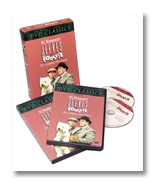Movies |
Jeeves & Wooster: The Complete First Season
By
Published: Jan 01, 2007
Category:
Comedy
No site with a butler can be considered complete without the most famous valet of them all, Jeeves. (So you know: Valets handle one person, butlers a whole household.). Most people know his name. Fewer are aware he was a character in P.G. Wodehouse’s stories of the airheaded upper class: the manservant of Bertram Wooster, a young man with far too much money and an aversion to work.
The books and short stories, which have titles like Carry on, Jeeves and Right Ho, Jeeves, are mostly told from Bertie’s point of view, and give the sense that he’s the sort of chap who cheerily talks non-stop and would be helpless without the brainy and formidable Jeeves. Wodehouse’s stories were mixed and matched into a rather faithful television series called "Jeeves and Wooster", starring Stephen Fry and Hugh Laurie, respectively.
The best part about the series was the leading cast—Fry and Laurie are a brilliant comic team who around the same time starred in their own comedy sketch show, "A Bit of Fry and Laurie." (Hugh Laurie is now extremely well-known in this country as the star of the medical show "House MD". In England, he’s also admired as a novelist.)
Fry and Laurie, best friends who met at Cambridge, know just how to play off each other. Laurie is adorably clueless and picked on as Wooster; Fry looms in the background, casting a reproving eye at the mishaps of his charge. They’re great physical comics. Especially amusing are their facial expressions: Laurie shows Wooster’s bumbling upper-class idiocy with the puff of his cheeks while Fry artfully conveys Jeeves’s displeasure at a outrageous hat with the subtle movement of his mouth and a raised eyebrow.
Of course, the world of Wodehouse is in itself funny. His characters have names such as Barmy Fotheringay-Phipps or Gussie Fink-Nottle. Misunderstandings lead to broken engagements and often petty theft, not to mention the meddling of dreaded aunts. The dialogue is sharp, witty, and full of phrases like "That puts the butter on the spinach!" and words like "ablutions" and "jocundity." The upper class is—as expected—ridiculous and trivial, yet charming in its own way, while the valets get together and discuss their masters as if they were pets to be trained. Furthermore, the beautiful scenery of 1920s England and New York, where the stories are set, bring their own delicious charm.
The complete series is out on DVD in region one, but with four seasons amounting to 23 episodes, about six episodes per season, it can be too much to spend for a newcomer to "Jeeves and Wooster." While the series starts off well, by the time the fourth season rolls around the stories start to get tiresome and ridiculous, and regrettably some of the minor parts change actors. The best option is to buy the first season, which will initiate you to the show with the original cast and the writing at its freshest.
For fans of British comedy or anyone with a good sense of humor, "Jeeves and Wooster" is sure to entertain and delight. If this series were a hat, Jeeves would heartily approve.
— by Christina Arlov Lachman, Guest Butler. Christina is a nineteen-year-old writer in training. She attends Pratt Institute, where she lives an artistic life with crazy art kids. She considers herself a full blown geek, finding quality obsessions like "Jeeves and Wooster" to occupy her time. On weekends and vacations, she is the daughter of Galina Arlov, who produces this website.
To buy "Jeeves and Wooster" from Amazon.com, click here.


